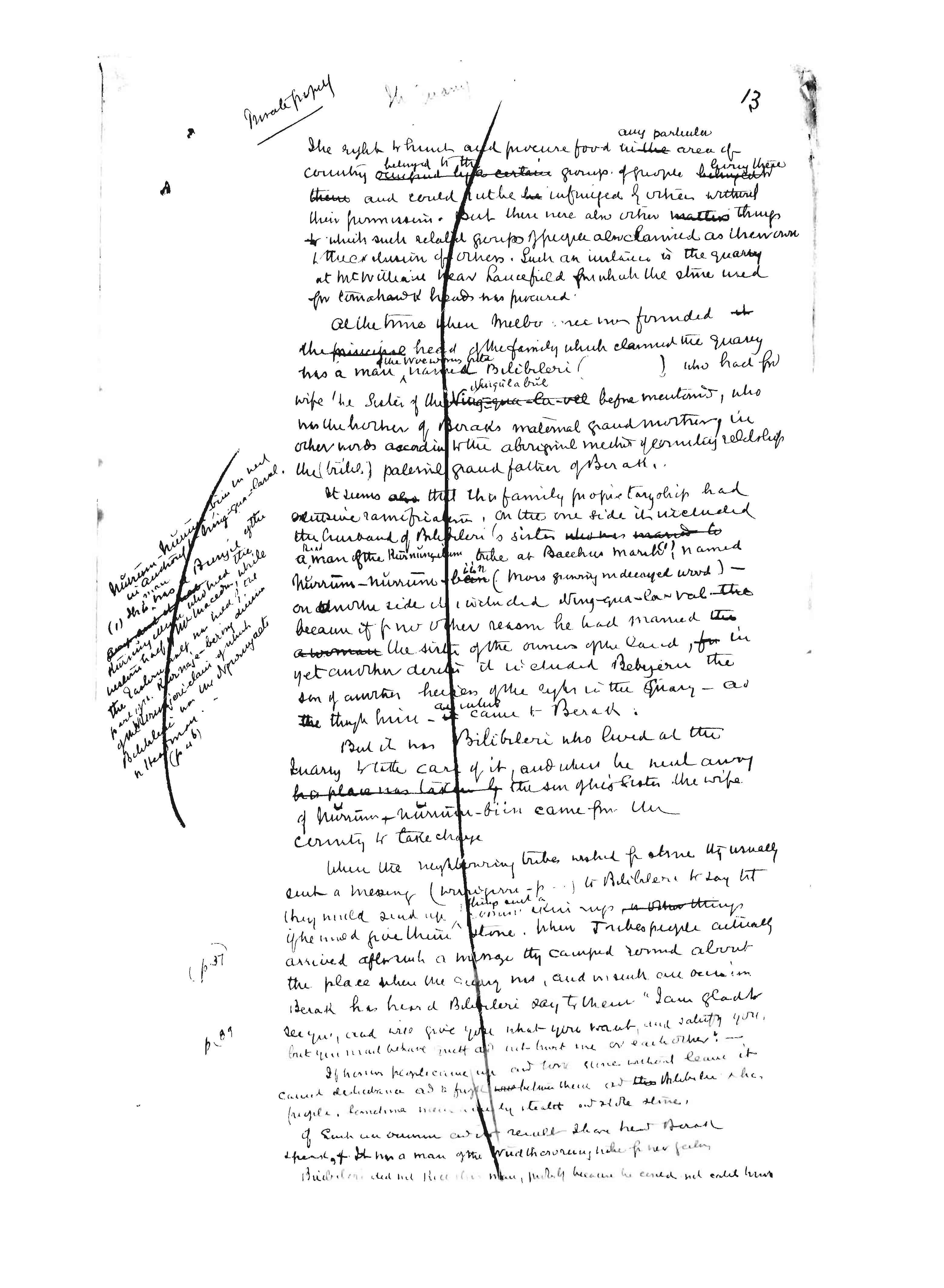Chapter V Tribal Governments

Transcription - Page 21
13
Private property [underlined] The Quarry
The right to hunt and procure food in [crossed out - the] any particular area of
country belonged to the [crossed out - occupied by a certain] group of people living there [crossed out - belonged to]
[crossed out - there] and could not be infringed by others without
their permissions. But there were also other [crossed out - matters] things
to which such related groups of people also claimed as their own
to the exclusion of others. Such an instance is the quarry
at Mt William near Lancefield from which the stone used
for tomahawk heads was procured.
At the time when Melbourne was founded [crossed out - it]
the [crossed out - principal] head of the family which claimed the quarry
was a man of the Woeworung tribe named Bilibileri ( ) who had for a
wife the sister of the Ningūlabŭl [crossed out - Ning-gua-la-vel] before mentioned, who
was the brother of Berak's maternal grand mother, in
other words according to the aboriginal method of country relationship
the (tribal) paternal grand father of Berak.
[Left margin note with next paragraph]
Nŭrrūm-nŭrrūm-biin is next
in authority to Ning-qua-la-val.
(1) This man was a Bunjil of the
[crossed out - group and it was ]
Kūrnŭng-illum who held the
western half of Mt Macedon, while
the Eastern half was held by that
part [?of?] Kurnaje-bering division
of the Wurunjeri-clan of which
Bilibileri was the Ngurungaeta
or Headman.
(p 46)
[End of left margin note]
It seems [crossed out - also] that this family proprietaryship had
extensive ramifications, on the one side it included
the husband of Bilibileri's sister [crossed out - who was married to]
a Head man of the Kūrnŭng-illum tribe at Bacchus Marsh (1), named
Nŭrrūm-nŭrrūm-biin (moss growing in decayed wood) -
on another side it included Ning-qua-la-val [crossed out - the]
because if for no other reason he had married [crossed out - the]
[crossed out - a woman] the sister of the owners of the land, [crossed out - for] in
yet another direction it included Bebejern the
son of another heiress of the rights in the quarry - and
[crossed out - the] through him - an interest came to Berak.
But it was Bilibileri who lived at the
Quarry to take care of it, and when he went away
[crossed out - his place was taken by] the son of his sister the wife
of Nŭrrūm-nŭrrūm-biin came from their
country to take charge.
When the neighbouring tribes wished for stone they usually
sent a messenger (wirrigerri p . . ) to Bilibileri to say that
they would send up things such as a possum skin rug [crossed out - or other things]
if he would give them stone. When Tribes people actually
arrived after such a message they camped round about
the place where the quarry was, and on such an occassion
Berak has heard Bilibileri say to them "I am glad to
see you, and will give you what you want, and satisfy you,
but you must behave quietly and not hurt me or each other." -
If however people came up and took stone without leave it
caused disturbance and to fight [crossed out - was] between them and [crossed out - the] Bilibileri + his
people. Sometimes men came by stealth and stole stone.
Of such an occasion and its result I have heard Berak
speak. It was a man of the Wūdtherorung tribe from near Geelong
Bilibileri did not kill this man, probably because he could not catch him
[written in left side margin]
(p. 37)
p 89
Document Details
